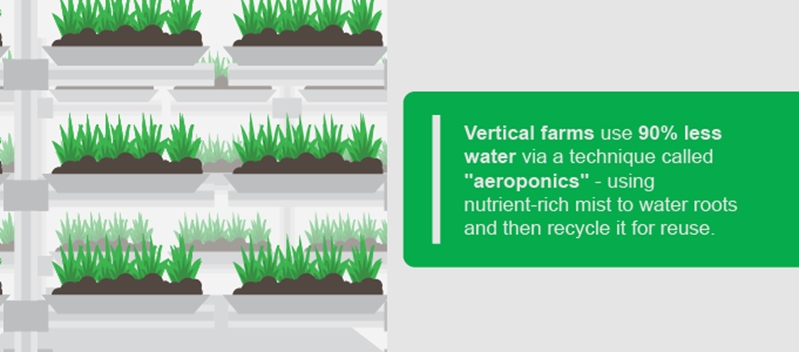
What happens when an old form of technology no longer cuts it, or is simply unsustainable? You transform it.
To name an example we can all familiarise ourselves with, sustainable agriculture is something on the lips of many people concerned about meeting the planets growing demand for food whilst balancing the environmental impact of such supply.
In high-density urban settings, land availability is at a premium, so traditional farming and agriculture methods are no longer the most practical option. So how do food manufacturers feed an expanding population without also converting more land for production? Instead of growing outwards, they grow up.
Vertical farms are a prime example of transforming traditional technology to meet the demands of future consumers. But it's not just agriculture undergoing rapid change. Communications technology is experiencing a similar transformation on the sharing and storing of data, with just as lofty goals.
What's the deal with vertical farms?
Vertical farms seem to follow the natural outcome of human population trends: densification and upward growth. Just as we build skyscrapers and apartment buildings to fit more people in per square metre, vertical farms aim to achieve a similar goal of high-intensity farming in a smaller space.
However, the benefit of such technology is not simply one of area. As an example, vertical farms address many of the water consumption problems associated with traditional agriculture, which already puts a huge strain on the global supply of fresh water. A 2014 study published in the Journal of Agriculture found that vertical farms use 90 per cent less water via a technique called "aeroponics" - using nutrient-rich mist to water roots and then recycle it for reuse, rather than irrigation.
Vertical farms seem to follow the natural outcome of human population trends: densification and upward growth.
It's interesting to think that, when faced with problems of efficiency and sustainability, very traditional technologies of agriculture can be turned on their head to provide solutions for existing and future problems. The same thinking can be applied elsewhere.
Businesses need to grow towards the cloud
Much like farming, communication technologies are undergoing a similar change. Disruptive technologies are shaking businesses almost daily, with many worrying about the impact unforeseen changes will have on their bottom line. With the many communication platforms available for companies to reach out to employees and consumers alike, it's no longer a sustainable practise to keep them in isolation of each other. Businesses that can't work seamlessly between email, chat, VoIP and even virtual platforms are at a disadvantage to their competitors who can.

By ditching traditional methods of storing and managing communications, businesses can move their data online to transform how they adapt in a changing environment. By taking advantage of cloud computing and hosted PBX, businesses can unify their communications in order to be more sustainable.
By ditching traditional methods, businesses can move their data online to transform how they adapt in a changing environment.
The Queensland government encourages its businesses to adopt the cloud for a number of reasons. A few of them include:
- Reduced IT costs as you no longer have to purchase expensive equipment.
- The ability to scale up or down to meet your needs.
- Having your data stored in a secure online location, affording your company continuity in the event of an emergency.
- Communication channels on a single platform, allowing your business to more easily communicate and share data outside of traditional methods.
- Data access from anywhere with just an internet connection, offering much needed flexibility to workplaces.
It remains to be seen just what effect vertical farms will have on the global food supply industry, yet you don't have to wait to see the benefits of the cloud first hand. To find out more about how unifying your communications via a move to the cloud can improve your business, get in touch with the team at Fonality today.


